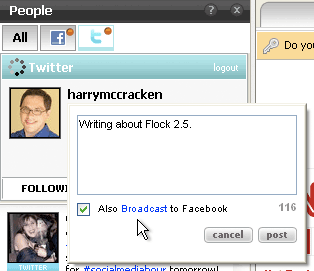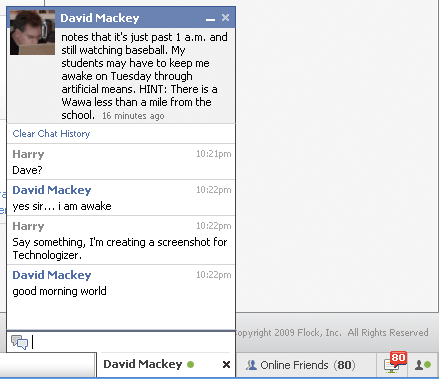Flock Gets Even More Social, Contemplates Its Future
By Harry McCracken | Tuesday, May 19, 2009 at 4:37 pm
 There was a time when I called Flock, the Mozilla-based browser with a social bent, my favorite Web browser. Lately, however, I’ve flitted from browser to browser–it’s not unusual for me to use Firefox, Chrome, IE 8, and Safari in the course of a given day–and have found myself drifting away from Flock. But the company released Flock 2.5, a new version today. And while it’s not bursting at the seams with new features, what’s there is formidable enough that I might find myself drifting back.
There was a time when I called Flock, the Mozilla-based browser with a social bent, my favorite Web browser. Lately, however, I’ve flitted from browser to browser–it’s not unusual for me to use Firefox, Chrome, IE 8, and Safari in the course of a given day–and have found myself drifting away from Flock. But the company released Flock 2.5, a new version today. And while it’s not bursting at the seams with new features, what’s there is formidable enough that I might find myself drifting back.
Flock’s defining virtue is its built-in support for social networks, media sharing sites, and blog platforms–everything from Facebook, Myspace, and Twitter to Flickr to WordPress. All of version 2.5’s additions involve more creative integration of external services such as these. The most notable one is probably its greatly expanded suite of Twitter-related features, which go far beyond the modest Twitter functionality in previous versions of Flock. You can tweet and retweet, view tweets, @mentions, and direct messages from your followers, and have your long, unwieldy URLs automatically converted into TinyURLs. Flock’s “My World” home page now sports a widget that lets you search Twitter and save your favorite searches (I wish this capability was built into Flock’s left-hand sidebar, too).

Essentially, Flock is now a full-fledged Twitter client, and while it doesn’t sport advanced features such as TweetDeck’s groups, it does quite a bit and does it well.
Version 2.5 also introduces instant messaging to the Flock mix for the first time, through support for Facebook Chat. The implementation is elegantly simple: The strip of Facebook Chat tools that sits at the bottom of Facebook itself now shows up at the bottom of your Flock window no matter which Web page you’re on. I’ve never warmed up to chatting on Facebook–I don’t stay on the site all that long, and my brain has trouble dealing with the notion of an IM client that lives within a single online service. But Flock’s Facebook-everywhere feature may get me chatting more often. (For now, Facebook Chat is Flock’s only native IM service, but the company says it intends to add other popular ones over time.)

The last major new feature is something Flock is calling Flockcast, although in its current incarnation, “Facebookcast” might be a more accurate moniker. When you perform various task on certain services–such as updating your Twitter profile or uploading photos to Flickr–you can choose to have Flock update Facebook to reflect your off-Facebook activity. The Twitter dialog box above shoes the “Also broadcast to Facebook” option, and here’s a snippet of my Facebook profile showing that the party photos I uploaded to Flickr show up as thumbnails on Facebook, with links to Flickr:

I’ve heard more than one Flock doubter dismiss the browser as not offering much that you can’t cobble together in Firefox through plugins and other tweaks. That’s not entirely true, but it’s also a tad beside the point–everything that Flock does can be done through other means. The browser’s unique value stems from its mostly-slick integration of lots of social features into one user interface, with no customization required. (It does, however, result in a fairly crowded environment, especially compared to Google Chrome’s minimalism–Flock is a lot less pleasant on my Asus EeePC netbook than on machines with more screen real estate.)
All in all, Flock 2.5 is a slick upgrade to a cool, useful piece of software. My biggest reservations about it relate not to the browser itself but to the fact that it’s built on top of Mozilla—a design decision that has multiple benefits (you get most of Firefox’s goodness) but also presents some challenges. Most notably, Flock’s development schedule is completely different from that of Firefox, which can leave Flock users waiting for the latest Firefox features.
When Firefox 3.0 was released, the Flock folks responded with a beta version of Flock built on the 3.0 underpinnings with impressive speed. This time around, Flock 2.5 is appearing not too long before Mozilla plans to release Firefox 3.5. But Flock CEO Shawn Hardin told me that the company is still formulating its plans for what comes after version 2.5, and isn’t ready to talk about a Firefox 3.5-based edition of Flock. In fact, when I asked him about rumors from last March that Flock intended to dump Mozilla for Google’s Chrome platform, he said that everything was up for consideration at this point, including jumping to a new platform.
(My uninformed guess is that it’s unlikely that Flock would have hatched definitive plans to adopt Chrome at this point, given that Flock runs on Windows, OS X, and Linux–Chrome’s OS X and Linux editions aren’t out yet, and there’s no public timetable for their release.)
A next-generation Flock that kept its Mozilla underpinnings could be just fine; so could a Chrome-based one. One of the nice things about browsers is that hopping back and forth is a cakewalk. So if you’re already a Flock fan, or it sounds intriguing, I wouldn’t hesitate to try version 2.5. Still, if I were a Flock user who couldn’t live without Firefox extensions, I’d be rooting for the browser to stick with Mozilla–and I hope that Flock either decides to stay with Mozilla (and moves to Firefox 3.5) soon, or tells the world that it’s going to make the transition to Chrome.
6 Comments
Read more:
3 Comments For This Post
3 Trackbacks For This Post
-
Firefox 3.5: The Technologizer Review | Technologizer Says:
June 30th, 2009 at 4:09 am[…] minimalist Chrome, Apple’s flashy Safari, the ever-inventive Opera, the highly social Flock, and even the no-longer-calcifying Internet Explorer […]
-
Five Reasons to Celebrate Firefox’s Fifth Birthday | Technologizer Says:
November 9th, 2009 at 10:04 am[…] 1.It reignited the browser wars. Back in 2004, Internet Explorer had more than ninety percent of the market and seemed to be on its way to as close to 100 percent as any product could conceivably attain. Other alternative browsers, such as Opera and earlier versions of Mozilla, had market shares that looked like rounding errors. Then Firefox appeared and quickly gained traction. Its strategy for success was a clever one: It was just a good browser, period. And today, there are more significant browsers than during any period since the inception of the Web: IE, Firefox, Safari, Chrome, Opera, and the Firefox variant I have a soft spot for, Flock. […]
-
Flock 3.0 Browser Review | Help With Spyware Says:
October 22nd, 2010 at 4:31 am[…] better; I liked it so much it became my default browser. Version 2.0 improved on it further. But version 2.5, which appeared more than a year ago, was instantly obsolescent: It was based on Firefox 3.0 even […]













May 19th, 2009 at 8:15 pm
Flock is more of a social browser from Mozilla it never got such a reputation as firefox got.
May 20th, 2009 at 6:20 am
I have been using Flock off and on since it first came out.
I get fed up with it and uninstall it and then get it back again.
I think I’m hooked.
This latest version has made it my new default browser.
If they could get the speed of Chrome, this browser would be amazing!
May 21st, 2009 at 6:09 pm
OK, you convinced me to give it a shot. Sure hope it improves upon Firefox with a true fullscreen/kiosk mode in OS X. We shall see. (Tabs are for tweeting.)